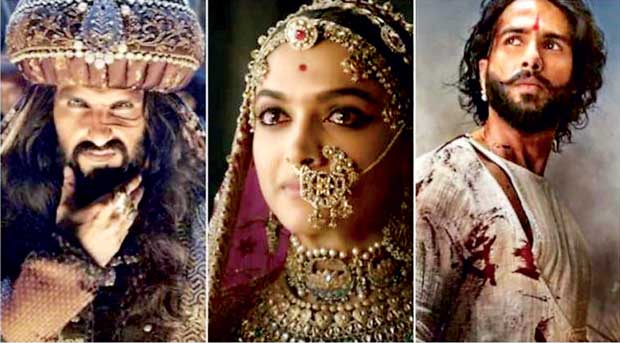Reply To:
Name - Reply Comment
Last Updated : 2024-04-19 16:08:00

Padmavati trio
 Controversy seems to be relentlessly dogging the Bollywood magnum opus Padmaavat. It was released on January 25, after a titanic struggle against a two-month-long politically-backed campaign marked by violence, persistent calls for a ban, threats and intimidation of the most horrific kind.
Controversy seems to be relentlessly dogging the Bollywood magnum opus Padmaavat. It was released on January 25, after a titanic struggle against a two-month-long politically-backed campaign marked by violence, persistent calls for a ban, threats and intimidation of the most horrific kind.
But release has not brought its maker, Sanjay Leela Bhansali, relief from controversies. Old controversies have been replaced by new ones.
While the pre-release issues were raised by right-wing, traditionalist, casteist and reactionary Hindutva forces, the new ones are being raised by leftist, liberal and secular elements concerned about the survival of fundamental and universally recognized human rights and the philosophy which underlies today’s multi-ethnic and multi-religious nations.
The pre-release controversy was over the alleged distortion of Rajput community culture, history and the role of the main protagonist, Rani Padmavati.
Karni Sena, a little known Rajput caste organization in Rajasthan (the locale of the story on which the film is based) sparked off a violent protest against the portrayals. It said that Rani Padmavati could not be shown romancing with a Muslim ruler Allauddin Khilji or dancing in public view exposing her midriff. Rajput groups across North India went on a rampage demanding, not just cuts, but a total ban of the film.
Alauddin Khilji is portrayed in the movie as an uncivilized and barbaric ruler. But she points out that it was under Khilji’s rule that the Delhi Sultanate drew heavily from Persia
The post-release controversies are, however, of a different kind. Liberals and secular intellectuals have begun voicing concern over the kind of culture and value system the film seems to glorify and promote through its powerful visual appeal.
They feel that the content of the film is tailored to the propaganda requirement of the Hindutva (extremist Hindu) forces which have gained prominence and power in North India under Prime Minister Narendra Modi. Demanding an exclusive Hinduistic India, these forces demand the subjugation of the minorities. They also glorify the Hindu past often irrationally as in the film Padmaavat.
From the inaccurate and ugly portrayal of the Muslim king Allauddin Khilji to the glorification of a banned custom Jauhar (the self-immolation of women who fear social dishonour after rape or widowhood), the film caters to the ideology of the Right-Wing, traditionalist and anti-Muslim Hindutva lobby.
 Anna Vetticaud
Anna Vetticaud
Writing in the website First Post, Anna Vetticaud says that while the Hindu Raja Ratan Singh (husband of Padmavati) is portrayed as pristine with his face cleansed by an Emami or Vaseline face wash, the Muslim king Alauddin Khilji is a perennially dirty-faced devil, his face forever smeared with what appears to be blood and mud even when he is not in battle. “Alauddin’s hair is wild, his walk almost bear-like, his eyes at all times either narrowed to slits or widened to convey his menacing intent, while Ratan Singh looks angelic.”
“And if Alauddin wants a woman for himself, he is portrayed as lustful, whereas Ratan Singh’s betrayal of his first queen for Padmavati is sweet romance,” Vetticaud points out.
“Alauddin and his uncle Jalaluddin (Raza Murad) are shown tearing into massive chunks of meat like savages, while Ratan Singh feeds himself delicate morsels of food. Bad Alauddin always wears black and other dark shades, whereas the good Ratan dons whites, beige and cheery colours. Wicked Alauddin stomps his feet in laughably animalistic dance moves to the song ‘Khalibali’ whereas Ratan, carries himself with dignity.”
“And get this, in what seems to be Bhansali’s ultimate signifier of debauchery, the nasty Muslim king’s male lover is trivialized – oh no! bisexuality! how terrible, no? – whereas the good Hindu man’s eye wanders with poise and only in the direction of women. Heterosexual promiscuity and infidelity are allowed, no?” Vitticaud wonders. “There is no pretence at objectivity or nuance in the contrasting portrayals of the two monarchs. This is a literal echo of the average Hindu right-winger’s view of Muslims as horny, carnivorous beasts,” she notes.
“Then there is the contradiction though it comes in the horribly romanticized depiction of Jauhar (self-immolation) although the opening disclaimer states that the film does not intend to glorify the custom. Really? Why then does a closing voice, right after the act is shown on screen, seek to deify Padmavati’s ‘sacrifice’? “
“She walks towards the flames, her hair blowing in the breeze, her voluminous skirt swirling about her ankles, her eyes burning with determination, full-bodied music playing in the background, joined by a sea of women clad in bridal red (including - I wanted to vomit when I saw this - a pregnant woman and a little girl) all voluntarily
approaching their death.”
Cruel, not uncivilized
Historian Rana Safvi, whose books have been published by Penguin India, has said that as opposed to historical facts, Alauddin Khilji is portrayed in the movie as an uncivilized and barbaric ruler. But she points out that it was under Khilji’s rule that the Delhi Sultanate drew heavily from Persia, one of the oldest and most sophisticated civilizations of all time. “The rulers of Delhi including Khilji followed the exact code of conduct and etiquette as in Persia. It would have been very formal - the eating, dining and sartorial choices,” Safvi points out. The historian admits that Khilji was cruel, would strike terror in the hearts of the enemy and was a relentless territorial expansionist, but he certainly observed the nuances of Persian culture which he promoted in his court and domain.
“The famous 13th Century poet, Amir Khusro, wrote about Khilji’s rule but did not describe him as a barbaric ruler,” Safvi recalls.
They feel that the content of the film is tailored to the propaganda requirement of the Hindutva (extremist Hindu) forces which have gained prominence and power in North India under Prime Minister Narendra Modi.
Women’s right to life
In an open letter to Bhansali, Bollywood actress and social activist Swara Bhasker says: “Women have the right to live, despite being raped Sir. Women have the right to live, despite the death of their husbands, male ‘protectors’, ‘owners’, ‘controllers of their sexuality’, whatever you understand the men to be.” “Women are not only walking talking vaginas. Yes, women have vaginas, but they have more to them as well. So their whole life need not be focused on the vagina, and controlling it, protecting it, maintaining its purity.”
“It would be nice if the vaginas are respected; but in the unfortunate case that they are not, a woman can continue to live. She need not be punished with death, because another person disrespected her vagina without her consent. There is life outside the vagina, and so there can be life after rape,” Bhasker says.
“Your film, it felt, had brought us back to that question from the Dark Ages – do women – widowed, raped, young, old, pregnant, pre-pubescent… do they have the right to live? I understand that Jauhar and Sati are a part of our social history. These happened. I understand that they are sensational, shocking dramatic occurrences that lend themselves to splendid, stark and stunning visual representation; especially in the hands of a consummate maker like yourself. But does that mean one should make a film about it with no perspective on racism? Or, without a comment on racial hatred?” Bhasker asks.
Banned practice
She pointed out that it was with great difficulty that a group of reform-minded Indians and the provincial British Colonial governments and Princely States in India abolished and criminalized Sati (the practice of burning widows on the funeral pyres of their dead husbands) in a series of judgments between 1829 and 1861. In independent India, The Indian Sati Prevention Act (1988) further criminalized any type of aiding, abetting, and glorifying of Sati.
“Your act of thoughtlessly glorifying this misogynistic criminal practice is something you ought to answer for,” Bhasker said.
Jahan Friday, 02 February 2018 08:23 PM
The film says Padmini was a Sinhala princess. Is it true? Never heard such story.

Add comment
Comments will be edited (grammar, spelling and slang) and authorized at the discretion of Daily Mirror online. The website also has the right not to publish selected comments.
Reply To:
Name - Reply Comment
On March 26, a couple arriving from Thailand was arrested with 88 live animal
According to villagers from Naula-Moragolla out of 105 families 80 can afford
Is the situation in Sri Lanka so grim that locals harbour hope that they coul
A recent post on social media revealed that three purple-faced langurs near t